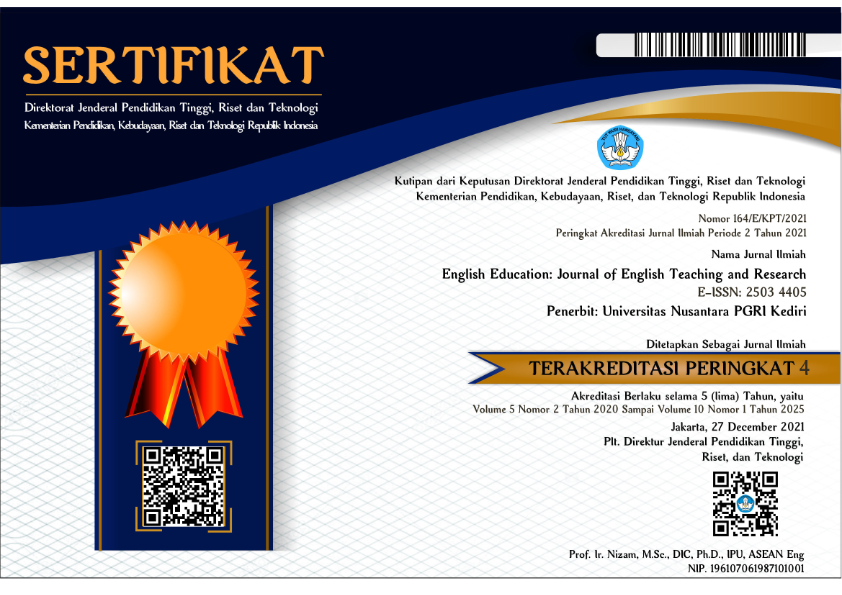MEASURING ENGLISH PROFICIENCY OF INDONESIAN BANKS’ FRONT-LINERS
DOI:
https://doi.org/10.29407/jetar.v5i2.14985Keywords:
front-liners, banks, English, communication, abilityAbstract
The industrial revolution and the free market policy agreement among the countries in the world brings severe impacts in many sectors, especially economics. As one of the supporting economics systems, the banking sector also faces the most significant challenge ever. The banks should provide their best services to the customers; otherwise, they will quickly leave them. This study determines how the front-liners’ (Customer Services and Tellers) can speak English to support their workplace activities. There are ten customer services and eight tellers from four banks as the respondents. The method used is quantitative, with a structured interview as the instrument to collect data. The researcher then measured the result of the talks by using a scoring rubric. The study's development reveals that those front-liners have different English proficiency levels, ranging from high to low. The banks where they work and the universities where they learned are responsible for overcoming this. It could be by restricting the new employee's entrance exam, providing training programs for the employees, and updating the universities' curriculum with the latest material to prepare their students to face the job market, which is very demanding today.
Downloads
References
Abdullah, A. N., & Talif, R. (2002). The Sociolinguistics of Banking: Language Use in Enhancing Capacities and Opportunities. Pertanika: Journal of Social Sciences & Humanities, 10(2), 109-116.
Amirullah. (2015). Metode Penelitian Manajemen. Malang: Banyumedia Publishing.
Chew, K. S. (2005). An Investigation of The English Language Skills Used by New Entrants in Banks in Hong Kong. English for Specific Purposes, 24, 423-435. DOI: 10.1016/j.esp.2005.02.004.
Hariyanti, P., & Utari, R. (2013). Pengaruh Aktivitas Customer Service dan Kepuasan Nasabah terhadap Loyalitas Nasabah Bank Riau Kepri Capem Panam Pekanbaru. Jurnal Komunikasi, 8(1), 63 – 78.
Hoang, A. P. Q. (2011). Employees’ Perception of The Role of Communication with Customers in Service Encounters: Case Studies at Bank Customer Services in Vietnam. Master Thesis. Sweden: University of Gothenburg.
Mohammadzadeh, S., Barati, T., & Fatemi, M. A. (2015). An Investigation into The English Language Needs of Bank Employees of Saderat Bank in Mashhad. Theory and Practice in Language Studies, 5(8), 1695-1702. DOI: http://dx.doi.org/10.17507/tpls.0508.21.
Muthiah, P. (2003). English Language Proficiency at the Workplace: Expectations of Bank Officers in Malaysia. Asian Englishes, 6(2), 64-81. DOI: 10.1080/13488678.2003.10801119.
Kiling, T. P. (2016). Peran Komunikasi Frontliner dalam Meningkatkan Pelayanan di PT BNI (Persero) Tbk Kantor Layanan Kawangkoan. Acta Diurna Komunikasi, 5(3), 1-9.
Kornharutai, C., & Clarke, B. (2015). Perception in English for Communication Among Bank Tellers at Bangkok Bank. The 4th LITU International Graduate Conference Proceeding, 4(1), 304-312.
Reni, D., & Asmawati, S. (2016). Kualitas Pelayanan Front liner dan Kepuasan Nasabah. Islaminomic, 7(2), 1 -15.
Runde, D. F., & Nealer, E. (2017). English Language Proficiency and Development. CSIS (Center for Strategic & International Studies). Retrieved from: https://www.csis.org/analysis/english-language-proficiency-and-development.
Sugiri, G. (2018). Peranan Layanan Customer Service terhadap Kepuasan Nasabah pada PT BCA KCU Kota Bekasi. Prosiding Festival Riset Ilmiah Manajemen dan Akuntansi. 903 – 910, ISSN 2614 – 6681.
Underhill, N. (1987). Testing Spoken Language: A Handbook of Oral testing Techniques. New York: Cambridge University Press.
Wu, R, Y, F., & Chin, J. S. (2010). An Investigation into The English Language Needs of Banking and Finance Professionals in Taiwan. Retrieved from www.lttc.ntu.edu.tw.
Zulfah., & Mujahidah. (2018). Investigating English Need of Sharia Bank Employees in ParePare South Sulawesi. Eternal: English, Teaching, Learning, and Research Journal, 4(2), 157-165. DOI: https://doi.org/10.24252/Eternal.V42.2018.A2.
Downloads
Published
Issue
Section
License
Authors who publish with this journal agree to the following terms:
- Copyright on any article is retained by the author(s).
- The author grants the journal, the right of first publication with the work simultaneously licensed under a Creative Commons Attribution License that allows others to share the work with an acknowledgment of the work’s authorship and initial publication in this journal.
- Authors are able to enter into separate, additional contractual arrangements for the non-exclusive distribution of the journal’s published version of the work (e.g., post it to an institutional repository or publish it in a book), with an acknowledgment of its initial publication in this journal.
- Authors are permitted and encouraged to post their work online (e.g., in institutional repositories or on their website) prior to and during the submission process, as it can lead to productive exchanges, as well as earlier and greater citation of published work.
- The article and any associated published material is distributed under the Creative Commons Attribution-ShareAlike 4.0 International License








 Article template
Article template



